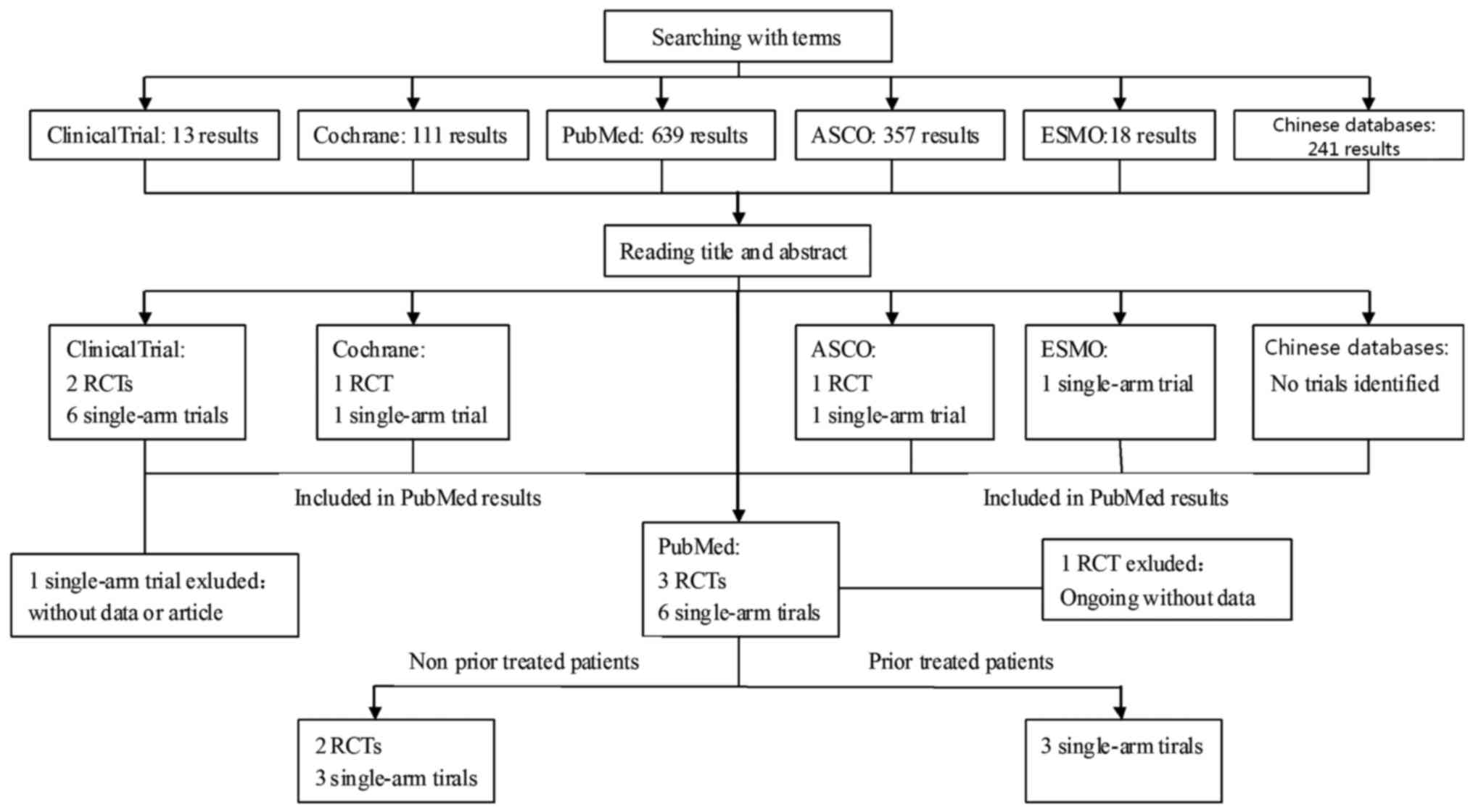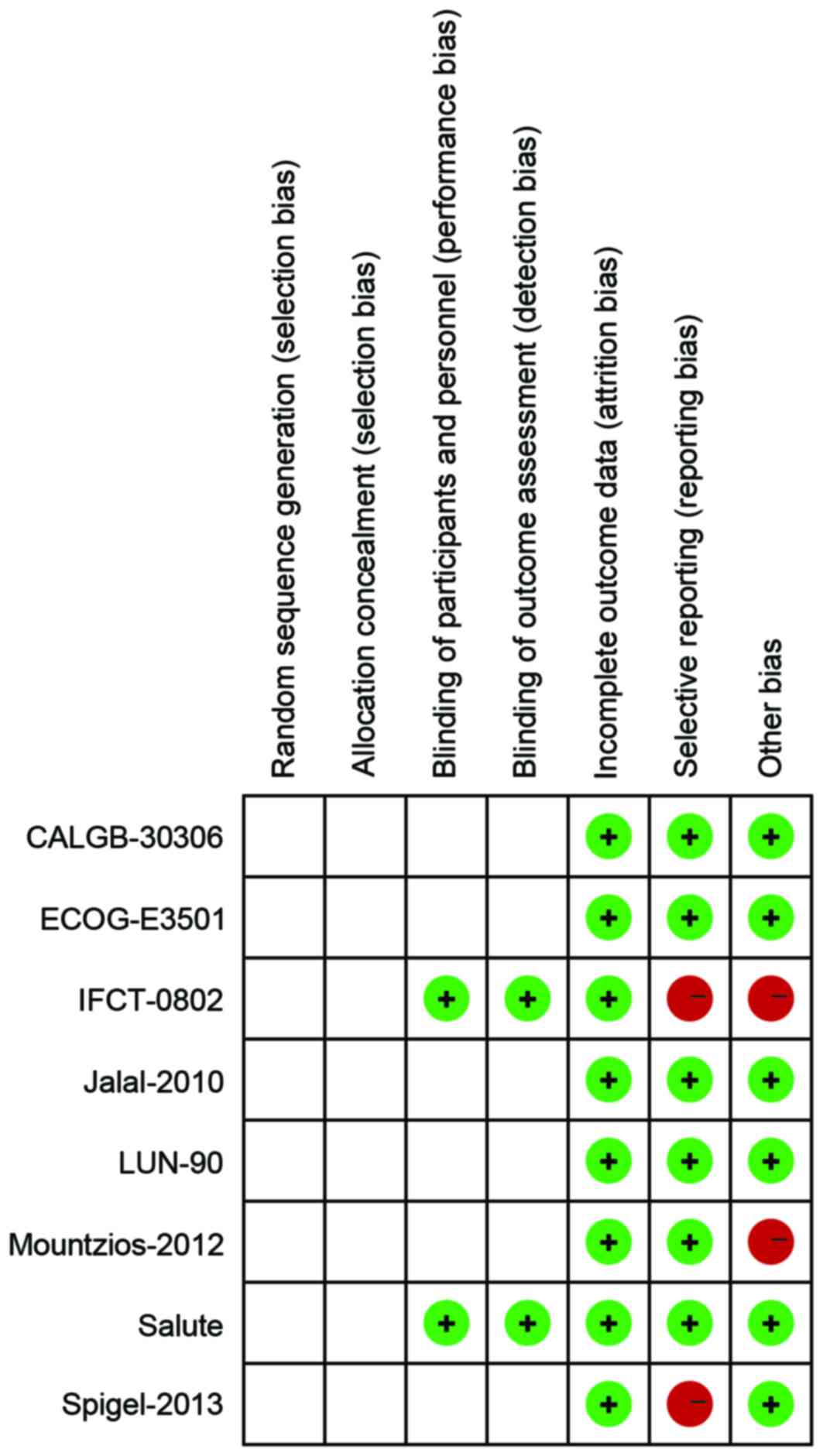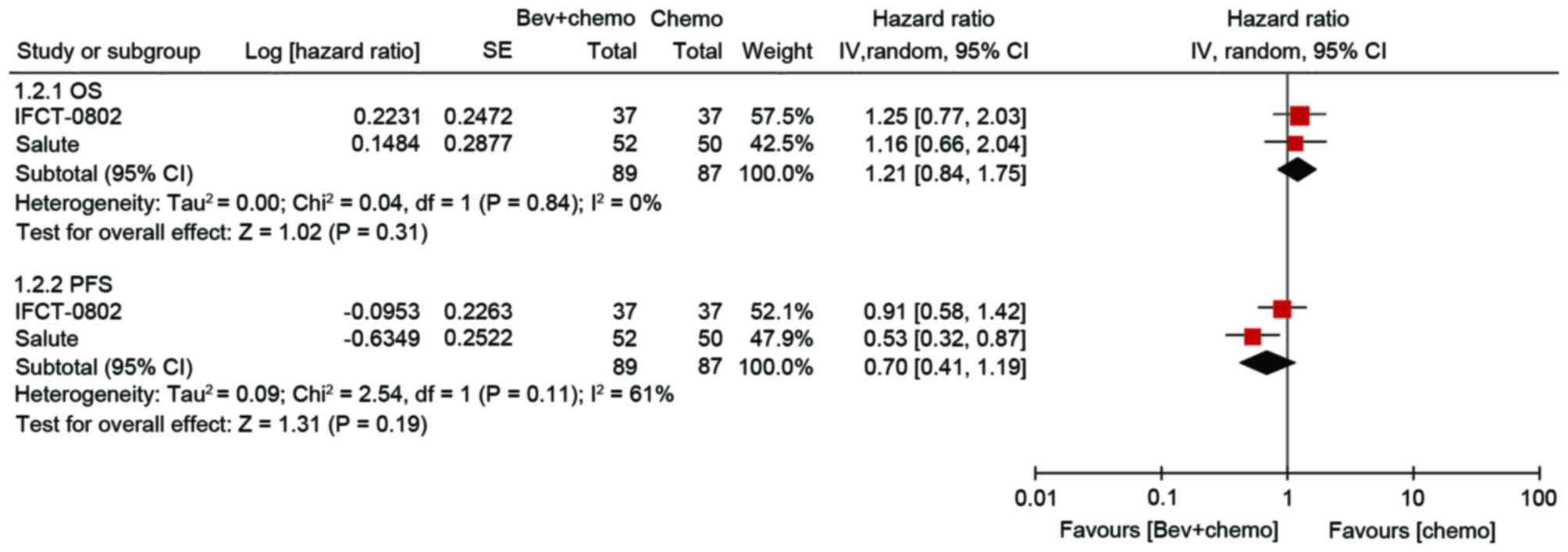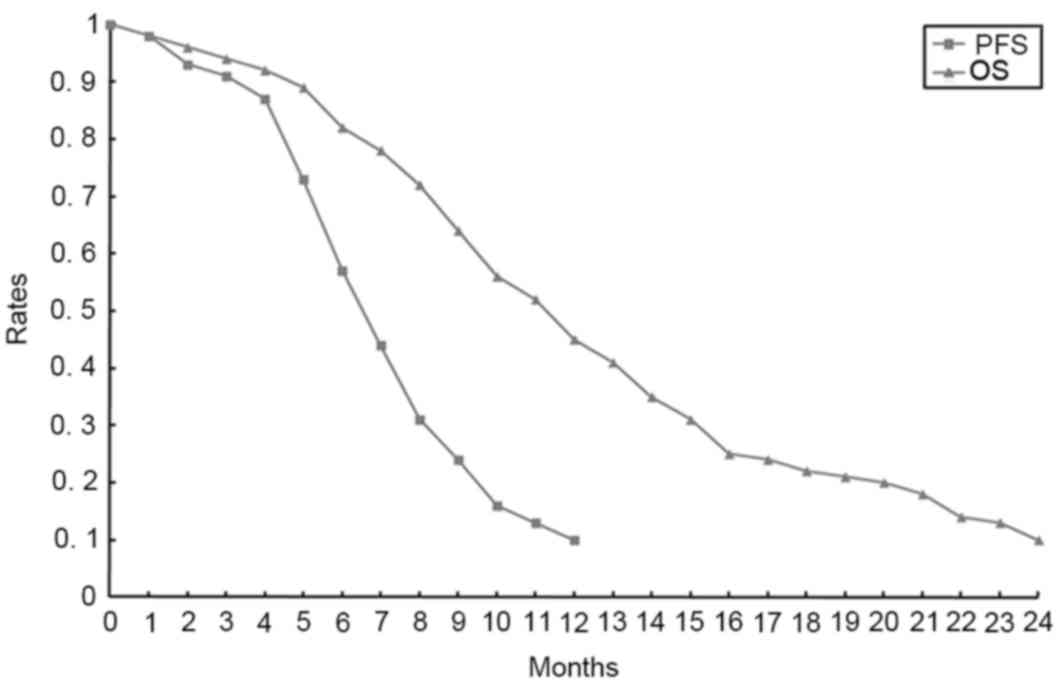|
1
|
Jemal A, Siegel R, Ward E, Hao Y, Xu J,
Murray T and Thun MJ: Cancer statistics, 2008. CA Cancer J Clin.
58:71–96. 2008. View Article : Google Scholar : PubMed/NCBI
|
|
2
|
Noda K, Nishiwaki Y, Kawahara M, Negoro S,
Sugiura T, Yokoyama A, Fukuoka M, Mori K, Watanabe K, Tamura T, et
al: Irinotecan plus cisplatin compared with etoposide plus
cisplatin for extensive small-cell lung cancer. N Engl J Med.
346:85–91. 2002. View Article : Google Scholar : PubMed/NCBI
|
|
3
|
Hanna N, Bunn PA Jr, Langer C, Einhorn L,
Guthrie T Jr, Beck T, Ansari R, Ellis P, Byrne M, Morrison M, et
al: Randomized phase III trial comparing irinotecan/cisplatin with
etoposide/cisplatin in patients with previously untreated
extensive-stage disease small-cell lung cancer. J Clin Oncol.
24:2038–2043. 2006. View Article : Google Scholar : PubMed/NCBI
|
|
4
|
Okamoto H, Watanabe K, Kunikane H,
Yokoyama A, Kudoh S, Asakawa T, Shibata T, Kunitoh H, Tamura T and
Saijo N: Randomised phase III trial of carboplatin plus etoposide
vs split doses of cisplatin plus etoposide in elderly or poor-risk
patients with extensive disease small-cell lung cancer: JCOG 9702.
Br J Cancer. 97:162–169. 2007. View Article : Google Scholar : PubMed/NCBI
|
|
5
|
Hermes A, Bergman B, Bremnes R, Ek L,
Fluge S, Sederholm C, Sundstrøm S, Thaning L, Vilsvik J, Aasebø U
and Sörenson S: Irinotecan plus carboplatin versus oral etoposide
plus carboplatin in extensive small-cell lung cancer: A randomized
phase III trial. J Clin Oncol. 26:4261–4267. 2008. View Article : Google Scholar : PubMed/NCBI
|
|
6
|
Stefanou D, Batistatou A, Arkoumani E,
Ntzani E and Agnantis NJ: Expression of vascular endothelial growth
factor (VEGF) and association with microvessel density in
small-cell and non-small-cell lung carcinomas. Histol Histopathol.
19:37–42. 2004.PubMed/NCBI
|
|
7
|
Lucchi M, Mussi A, Fontanini G, Faviana P,
Ribechini A and Angeletti CA: Small cell lung carcinoma (SCLC): The
angiogenic phenomenon. Eur J Cardiothorac Surg. 21:1105–1110. 2002.
View Article : Google Scholar : PubMed/NCBI
|
|
8
|
Spigel DR, Townley PM, Waterhouse DM, Fang
L, Adiguzel I, Huang JE, Karlin DA, Faoro L, Scappaticci FA and
Socinski MA: Randomized phase II study of bevacizumab in
combination with chemotherapy in previously untreated
extensive-stage small-cell lung cancer: Results from the SALUTE
trial. J Clin Oncol. 29:2215–2222. 2011. View Article : Google Scholar : PubMed/NCBI
|
|
9
|
Pujol JL, Lavole A, Quoix E, Molinier O,
Souquet PJ, Barlesi F, Le Caer H, Moro-Sibilot D, Fournel P, Oster
JP, et al: Randomized phase II–III study of bevacizumab in
combination with chemotherapy in previously untreated extensive
small-cell lung cancer: Results from the IFCT-0802 trialdagger. Ann
Oncol. 26:908–914. 2015. View Article : Google Scholar : PubMed/NCBI
|
|
10
|
Guyot P, Ades AE, Ouwens MJ and Welton NJ:
Enhanced secondary analysis of survival data: Reconstructing the
data from published Kaplan-Meier survival curves. BMC Med Res
Methodol. 12:92012. View Article : Google Scholar : PubMed/NCBI
|
|
11
|
John T: Role of immunotherapy in lung
cancer: Preliminary results of new vaccines and immune checkpoint
inhibitors. Asia Pac J Clin Oncol. 11 Suppl 1:2–8. 2015. View Article : Google Scholar : PubMed/NCBI
|
|
12
|
Tiseo M, Boni L, Ambrosio F, Camerini A,
Vitale MG, Baldini E, Cinieri S, Zanelli F, Defraia E, Passalacqua
R, et al: Italian multicenter phase III randomized study of
cisplatin-etoposide with or without bevacizumab as first-line
treatment in extensive stage small cell lung cancer: Treatment
rationale and protocol design of the GOIRC-AIFA FARM6PMFJM trial.
Clin Lung Cancer. 16:67–70. 2015. View Article : Google Scholar : PubMed/NCBI
|
|
13
|
Ready NE, Dudek AZ, Pang HH, Hodgson LD,
Graziano SL, Green MR and Vokes EE: Cisplatin, irinotecan, and
bevacizumab for untreated extensive-stage small-cell lung cancer:
CALGB 30306, a phase II study. J Clin Oncol. 29:4436–4441. 2011.
View Article : Google Scholar : PubMed/NCBI
|
|
14
|
Spigel DR, Greco FA, Zubkus JD, Murphy PB,
Saez RA, Farley C, Yardley DA, Burris HA III and Hainsworth JD:
Phase II trial of irinotecan, carboplatin, and bevacizumab in the
treatment of patients with extensive-stage small-cell lung cancer.
J Thorac Oncol. 4:1555–1560. 2009. View Article : Google Scholar : PubMed/NCBI
|
|
15
|
Horn L, Dahlberg SE, Sandler AB, Dowlati
A, Moore DF, Murren JR and Schiller JH: Phase II study of cisplatin
plus etoposide and bevacizumab for previously untreated,
extensive-stage small-cell lung cancer: Eastern Cooperative
Oncology Group Study E3501. J Clin Oncol. 27:6006–6011. 2009.
View Article : Google Scholar : PubMed/NCBI
|
|
16
|
Mountzios G, Emmanouilidis C, Vardakis N,
Kontopodis E, Hatzidaki D, Popis E, Karachaliou N, Kotsakis A,
Agelidou M and Georgoulias V: Paclitaxel plus bevacizumab in
patients with chemoresistant relapsed small cell lung cancer as
salvage treatment: A phase II multicenter study of the Hellenic
Oncology Research Group. Lung Cancer. 77:146–150. 2012. View Article : Google Scholar : PubMed/NCBI
|
|
17
|
Jalal S, Bedano P, Einhorn L, Bhatia S,
Ansari R, Bechar N, Koneru K, Govindan R, Wu J, Yu M, et al:
Paclitaxel plus bevacizumab in patients with chemosensitive
relapsed small cell lung cancer: A safety, feasibility, and
efficacy study from the Hoosier Oncology Group. J Thorac Oncol.
5:2008–2011. 2010. View Article : Google Scholar : PubMed/NCBI
|
|
18
|
Spigel DR, Waterhouse DM, Lane S, Legenne
P and Bhatt K: Efficacy and safety of oral topotecan and
bevacizumab combination as second-line treatment for relapsed
small-cell lung cancer: An open-label multicenter single-arm phase
II study. Clin Lung Cancer. 14:356–363. 2013. View Article : Google Scholar : PubMed/NCBI
|
|
19
|
Rossi A, Di Maio M, Chiodini P, Rudd RM,
Okamoto H, Skarlos DV, Früh M, Qian W, Tamura T, Samantas E, et al:
Carboplatin- or cisplatin-based chemotherapy in first-line
treatment of small-cell lung cancer: The COCIS meta-analysis of
individual patient data. J Clin Oncol. 30:1692–1698. 2012.
View Article : Google Scholar : PubMed/NCBI
|
|
20
|
Lara PN Jr, Natale R, Crowley J, Lenz HJ,
Redman MW, Carleton JE, Jett J, Langer CJ, Kuebler JP, Dakhil SR,
et al: Phase III trial of irinotecan/cisplatin compared with
etoposide/cisplatin in extensive-stage small-cell lung cancer:
Clinical and pharmacogenomic results from SWOG S0124. J Clin Oncol.
27:2530–2535. 2009. View Article : Google Scholar : PubMed/NCBI
|
|
21
|
Zatloukal P, Cardenal F, Szczesna A,
Gorbunova V, Moiseyenko V, Zhang X, Cisar L, Soria JC, Domine M and
Thomas M: A multicenter international randomized phase III study
comparing cisplatin in combination with irinotecan or etoposide in
previously untreated small-cell lung cancer patients with extensive
disease. Ann Oncol. 21:1810–1816. 2010. View Article : Google Scholar : PubMed/NCBI
|
|
22
|
Schmittel A, Sebastian M, von Weikersthal
L Fischer, Martus P, Gauler TC, Kaufmann C, Hortig P, Fischer JR,
Link H, Binder D, et al: A German multicenter, randomized phase III
trial comparing irinotecan-carboplatin with etoposide-carboplatin
as first-line therapy for extensive-disease small-cell lung cancer.
Ann Oncol. 22:1798–1804. 2011. View Article : Google Scholar : PubMed/NCBI
|
|
23
|
von Pawel J, Schiller JH, Shepherd FA,
Fields SZ, Kleisbauer JP, Chrysson NG, Stewart DJ, Clark PI, Palmer
MC, Depierre A, et al: Topotecan versus cyclophosphamide,
doxorubicin, and vincristine for the treatment of recurrent
small-cell lung cancer. J Clin Oncol. 17:658–667. 1999. View Article : Google Scholar : PubMed/NCBI
|
|
24
|
von Pawel J, Jotte R, Spigel DR, O'Brien
ME, Socinski MA, Mezger J, Steins M, Bosquée L, Bubis J, Nackaerts
K, et al: Randomized phase III trial of amrubicin versus topotecan
as second-line treatment for patients with small-cell lung cancer.
J Clin Oncol. 32:4012–4019. 2014. View Article : Google Scholar : PubMed/NCBI
|
|
25
|
O'Brien ME, Ciuleanu TE, Tsekov H, Shparyk
Y, Cuceviá B, Juhasz G, Thatcher N, Ross GA, Dane GC and Crofts T:
Phase III trial comparing supportive care alone with supportive
care with oral topotecan in patients with relapsed small-cell lung
cancer. J Clin Oncol. 24:5441–5447. 2006. View Article : Google Scholar : PubMed/NCBI
|
|
26
|
Eckardt JR, von Pawel J, Pujol JL, Papai
Z, Quoix E, Ardizzoni A, Poulin R, Preston AJ, Dane G and Ross G:
Phase III study of oral compared with intravenous topotecan as
second-line therapy in small-cell lung cancer. J Clin Oncol.
25:2086–2092. 2007. View Article : Google Scholar : PubMed/NCBI
|
|
27
|
Singh M and Ferrara N: Modeling and
predicting clinical efficacy for drugs targeting the tumor milieu.
Nat Biotechnol. 30:648–657. 2012. View
Article : Google Scholar : PubMed/NCBI
|
|
28
|
Kowanetz M and Ferrara N: Vascular
endothelial growth factor signaling pathways: Therapeutic
perspective. Clin Cancer Res. 12:5018–5022. 2006. View Article : Google Scholar : PubMed/NCBI
|
|
29
|
Moffat BA, Chen M, Kariaapper MS, Hamstra
DA, Hall DE, Stojanovska J, Johnson TD, Blaivas M, Kumar M,
Chenevert TL, et al: Inhibition of vascular endothelial growth
factor (VEGF)-A causes a paradoxical increase in tumor blood flow
and up-regulation of VEGF-D. Clin Cancer Res. 12:1525–1532. 2006.
View Article : Google Scholar : PubMed/NCBI
|
|
30
|
Pujol JL, Breton JL, Gervais R, Tanguy ML,
Quoix E, David P, Janicot H, Westeel V, Gameroff S, Genève J and
Maraninchi D: Phase III double-blind, placebo-controlled study of
thalidomide in extensive-disease small-cell lung cancer after
response to chemotherapy: An intergroup study FNCLCC cleo04 IFCT
00–01. J Clin Oncol. 25:3945–3951. 2007. View Article : Google Scholar : PubMed/NCBI
|
|
31
|
Arnold AM, Seymour L, Smylie M, Ding K,
Ung Y, Findlay B, Lee CW, Djurfeldt M, Whitehead M, Ellis P, et al:
Phase II study of vandetanib or placebo in small-cell lung cancer
patients after complete or partial response to induction
chemotherapy with or without radiation therapy: National Cancer
Institute of Canada Clinical Trials Group Study BR.20. J Clin
Oncol. 25:4278–4284. 2007. View Article : Google Scholar : PubMed/NCBI
|
|
32
|
Allen JW, Moon J, Redman M, Gadgeel SM,
Kelly K, Mack PC, Saba HM, Mohamed MK, Jahanzeb M and Gandara DR:
Southwest Oncology Group S0802: A randomized, phase II trial of
weekly topotecan with and without ziv-aflibercept in patients with
platinum-treated small-cell lung cancer. J Clin Oncol.
32:2463–2470. 2014. View Article : Google Scholar : PubMed/NCBI
|
|
33
|
Klagsbrun M and D'Amore PA: Regulators of
angiogenesis. Annu Rev Physiol. 53:217–239. 1991. View Article : Google Scholar : PubMed/NCBI
|
|
34
|
Peifer M, Fernandez-Cuesta L, Sos ML,
George J, Seidel D, Kasper LH, Plenker D, Leenders F, Sun R, Zander
T, et al: Integrative genome analyses identify key somatic driver
mutations of small-cell lung cancer. Nat Genet. 44:1104–1110. 2012.
View Article : Google Scholar : PubMed/NCBI
|
|
35
|
Rudin CM, Durinck S, Stawiski EW, Poirier
JT, Modrusan Z, Shames DS, Bergbower EA, Guan Y, Shin J, Guillory
J, et al: Comprehensive genomic analysis identifies SOX2 as a
frequently amplified gene in small-cell lung cancer. Nat Genet.
44:1111–1116. 2012. View Article : Google Scholar : PubMed/NCBI
|
|
36
|
Pietanza MC and Ladanyi M: Bringing the
genomic landscape of small-cell lung cancer into focus. Nat Genet.
44:1074–1075. 2012. View Article : Google Scholar : PubMed/NCBI
|
|
37
|
Kerbel R and Folkman J: Clinical
translation of angiogenesis inhibitors. Nat Rev Cancer. 2:727–739.
2002. View
Article : Google Scholar : PubMed/NCBI
|
|
38
|
Hasegawa Y, Takanashi S, Okudera K,
Kumagai M, Hayashi A, Morimoto T and Okumura K: Vascular
endothelial growth factor level as a prognostic determinant of
small cell lung cancer in Japanese patients. Intern Med. 44:26–34.
2005. View Article : Google Scholar : PubMed/NCBI
|
|
39
|
Salven P, Ruotsalainen T, Mattson K and
Joensuu H: High pre-treatment serum level of vascular endothelial
growth factor (VEGF) is associated with poor outcome in small-cell
lung cancer. Int J Cancer. 79:144–146. 1998. View Article : Google Scholar : PubMed/NCBI
|
|
40
|
Shojaei F, Wu X, Malik AK, Zhong C,
Baldwin ME, Schanz S, Fuh G, Gerber HP and Ferrara N: Tumor
refractoriness to anti-VEGF treatment is mediated by CD11b+Gr1+
myeloid cells. Nat Biotechnol. 25:911–920. 2007. View Article : Google Scholar : PubMed/NCBI
|
|
41
|
Phan VT, Wu X, Cheng JH, Sheng RX, Chung
AS, Zhuang G, Tran C, Song Q, Kowanetz M, Sambrone A, et al:
Oncogenic RAS pathway activation promotes resistance to anti-VEGF
therapy through G-CSF-induced neutrophil recruitment. Proc Natl
Acad Sci USA. 110:pp. 6079–6084. 2013; View Article : Google Scholar : PubMed/NCBI
|
|
42
|
Reck M, von Pawel J, Zatloukal P, Ramlau
R, Gorbounova V, Hirsh V, Leighl N, Mezger J, Archer V, Moore N and
Manegold C: Phase III trial of cisplatin plus gemcitabine with
either placebo or bevacizumab as first-line therapy for nonsquamous
non-small-cell lung cancer: AVAil. J Clin Oncol. 27:1227–1234.
2009. View Article : Google Scholar : PubMed/NCBI
|
|
43
|
Koeberle D, Betticher DC, von Moos R,
Dietrich D, Brauchli P, Baertschi D, Matter K, Winterhalder R,
Borner M, Anchisi S, et al: Bevacizumab continuation versus no
continuation after first-line chemotherapy plus bevacizumab in
patients with metastatic colorectal cancer: A randomized phase III
non-inferiority trial (SAKK 41/06). Ann Oncol. 26:709–714. 2015.
View Article : Google Scholar : PubMed/NCBI
|
|
44
|
Miles D, Harbeck N, Escudier B, Hurwitz H,
Saltz L, van Cutsem E, Cassidy J, Mueller B and Sirzén F: Disease
course patterns after discontinuation of bevacizumab: Pooled
analysis of randomized phase III trials. J Clin Oncol. 29:83–88.
2011. View Article : Google Scholar : PubMed/NCBI
|
|
45
|
Schmittel A, von Weikersthal L Fischer,
Sebastian M, Martus P, Schulze K, Hortig P, Reeb M, Thiel E and
Keilholz U: A randomized phase II trial of irinotecan plus
carboplatin versus etoposide plus carboplatin treatment in patients
with extended disease small-cell lung cancer. Ann Oncol.
17:663–667. 2006. View Article : Google Scholar : PubMed/NCBI
|


















